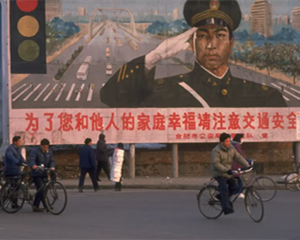I saw how much I had never even known to ask. The essay showed how quick his mind was, his sharp awareness of the history he was living through. I looked for his other writings. He had published four volumes of fiction and countless articles in journals and newspapers. But during the chaotic years of the Cultural Revolution and its aftermath, his books had gone out of print. Our family had lost their copies. I asked my relatives to help me find them, and even enlisted Chinese friends to help me search, but novels by Qian Feng weren't listed in the used books databases, and I still haven't found them.
我看到了很多我從未知道也從未想要問的東西。從這篇文章能看出爺爺思維的敏捷,他對自己所經歷的歷史有著敏銳的認識。我又找了一些他的其他作品。他出版了四卷小說,在報刊雜志上發表過無數篇文章。然而他的書在文革及其余波的混亂歲月里已經絕版,就連家里的副本也已丟失。我曾托親戚幫我找,還找了中國朋友幫我找,然而錢峰的小說并沒有列在舊書數據庫里,所以到現在我也沒有找到。
Some notes from my journal, from that visit to China:
我日記中的一些筆記,關于那次中國之行:
At dinner with yeye, he looked at me and said, zhe ge gu niang shen me gui xing? ('What is this girl's last name,' or more properly, 'What family is this girl from?') …
記得我和爺爺在餐桌上,他望著我說:這位姑娘貴姓?(“這個女孩姓什么?”或者更確切地說,“這個閨女是誰家的?”)
Later we asked him how old he was, and he said 95. How many children did he have? Three. What were their names? Xiaojiang, Xiaobing, Xiaoer. Xiaosan. Then my aunt asked, So how many children is that? Isn't that four? Do you have any other children, or is that it? (He'd forgotten his fifth child, his eldest daughter.) …
后來我們問他多大了,他說95歲。問他有幾個孩子?三個。他們叫什么名字?小江、小兵、小二、小三。阿姨又問:這是幾個孩子?這不是四個嗎?你還有其他孩子嗎,還是就這些了?(他忘記了他的第五個孩子,他的大女兒)……

At dinner I watched nainai break open a crab shell and spoon the yellow yolk on to bread for yeye, very quietly, while everyone else was talking. Jostling his elbow so he'd look down and see the bread in his hand, and methodically, unthinkingly eat it. His eyes barely open any more, I don't know if he sees. …
吃飯時,當其他人都在說話的時候,我靜靜地看著奶奶掰開一個蟹殼,把蛋黃舀到饅頭上喂爺爺。奶奶碰碰他的胳膊肘,他低頭看到手里的饅頭,然后就想也不想地慢慢吃下去。他的眼睛也快睜不開了,我不知道他能不能看到。 …
I realised this may be the last time I see yeye.
我意識到這可能是我最后一次見爺爺。
After her birthday dinner, I spent three days interviewing my grandmother. Because she spoke in a thick dialect, my aunt had to be there to translate into standard Mandarin for me. In the evenings the three of us piled into the old, familiar bedroom across the only bathroom in the apartment, my grandmother grumbling about her hearing aids while I fiddled with the microphone. Together, we tried to cobble together some understanding of her history.
在祖母的生日晚餐后,我花了三天時間采訪她。因為她的方言很重,我的阿姨必須在那里幫我翻譯成標準的普通話。晚上,我們三個人擠進公寓唯一一間浴室對面的那間又老又熟悉的臥室,我的祖母在抱怨她的助聽器,而我則在擺弄麥克風。我們試圖將她的過去拼湊起來。











